Personal Worldview and Philosophical View of Nursing Practice
VerifiedAdded on 2022/10/18
|6
|1520
|14
Essay
AI Summary
This essay explores the student's personal worldview in relation to the philosophical view of nursing practice, emphasizing the impact of religious, spiritual, and cultural elements on patient care. The student highlights the importance of acknowledging patient diversity to provide individualized care, referencing various religious beliefs and cultural practices. The essay discusses the transcultural nursing theory, emphasizing cultural competency and its application in a real-life scenario where a failure to consider a patient's religious beliefs led to complications. The student concludes by reiterating the significance of respecting patient diversity and integrating this understanding into future nursing practice to ensure patient satisfaction and holistic care. The student believes that all caregivers should be culturally competent to enable them to interact with patients from all parts of the world. Cultural competency involves knowing the ethnicity of the patient. People’s genetic makeup may influence their reaction towards some medications.
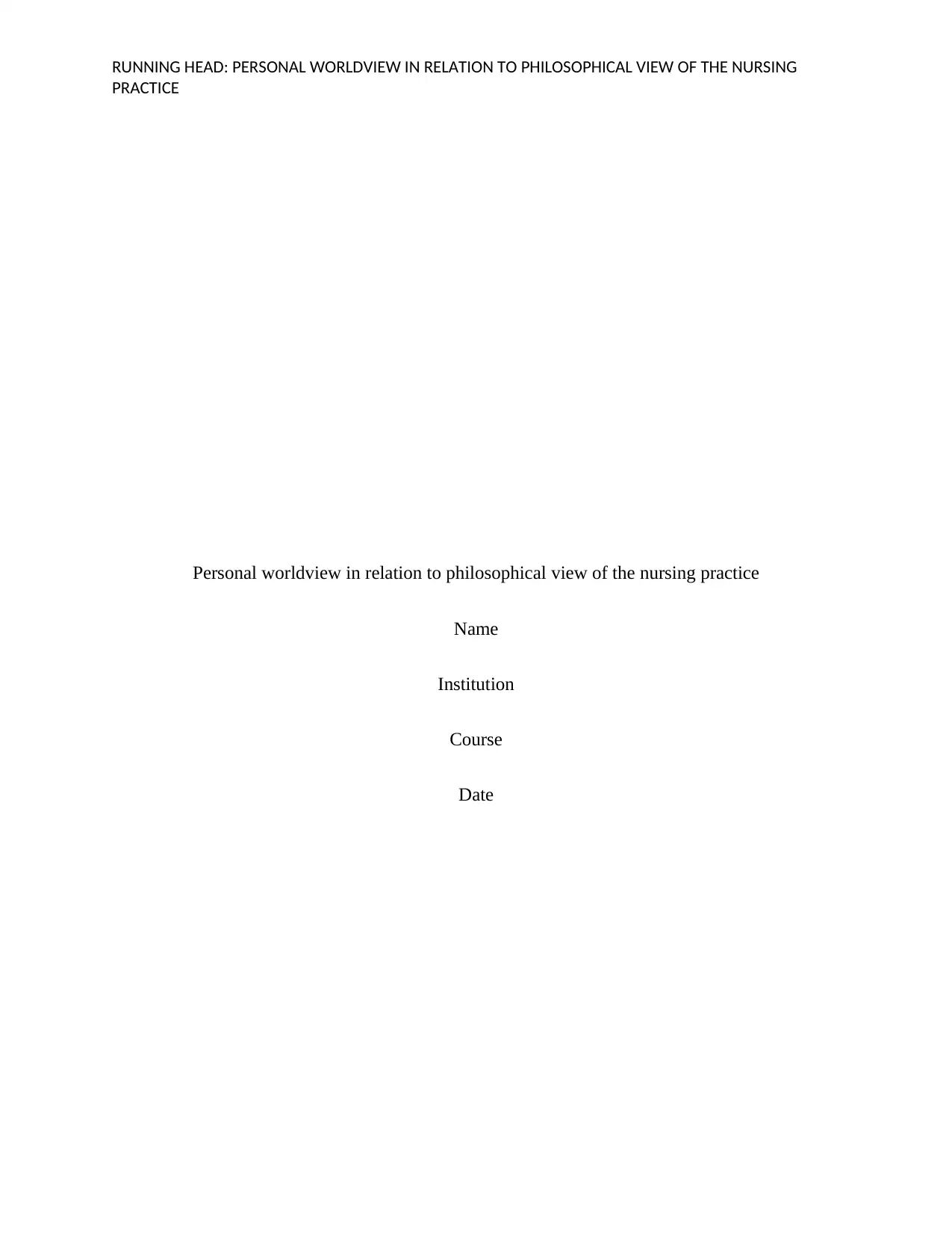
RUNNING HEAD: PERSONAL WORLDVIEW IN RELATION TO PHILOSOPHICAL VIEW OF THE NURSING
PRACTICE
Personal worldview in relation to philosophical view of the nursing practice
Name
Institution
Course
Date
PRACTICE
Personal worldview in relation to philosophical view of the nursing practice
Name
Institution
Course
Date
Paraphrase This Document
Need a fresh take? Get an instant paraphrase of this document with our AI Paraphraser
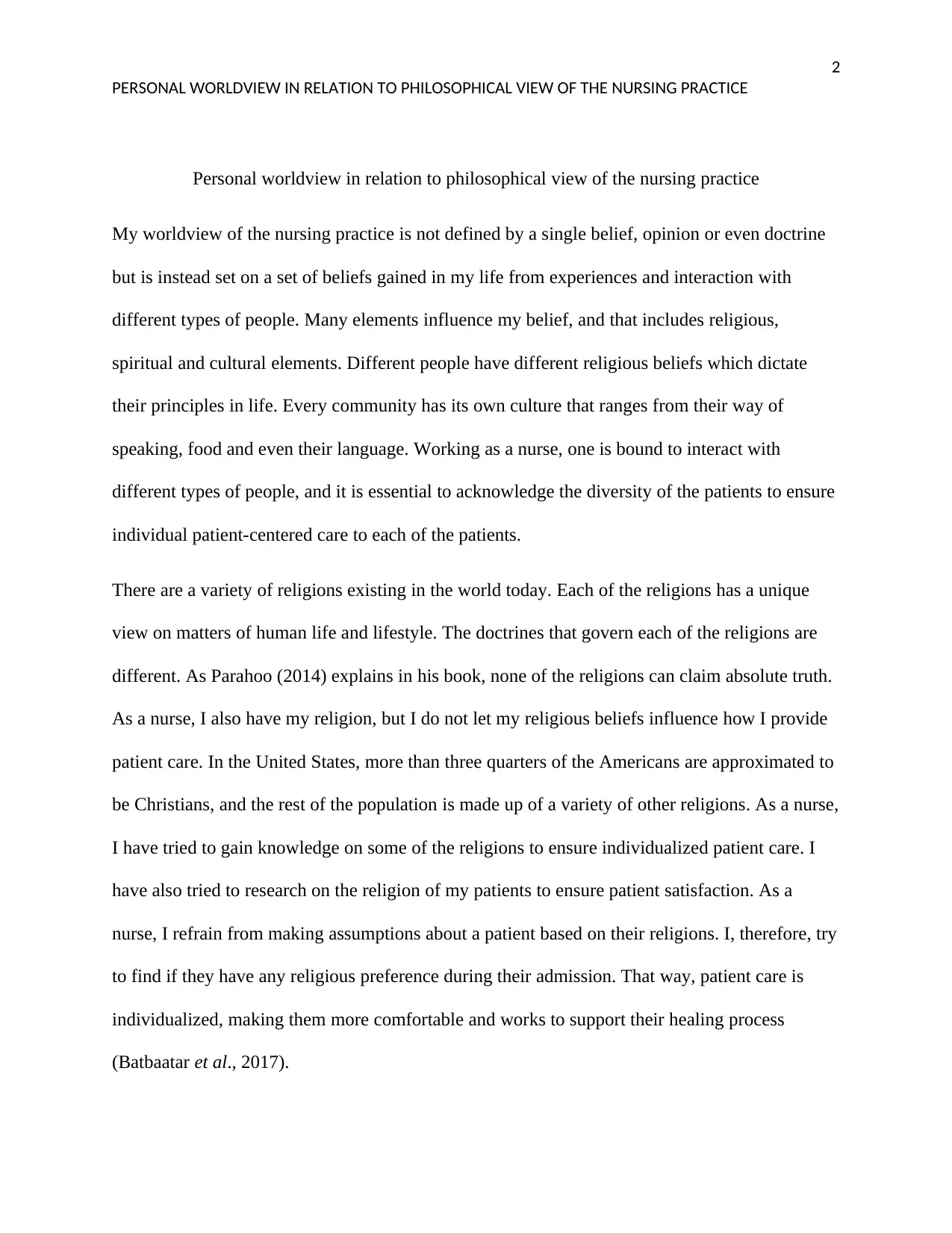
2
PERSONAL WORLDVIEW IN RELATION TO PHILOSOPHICAL VIEW OF THE NURSING PRACTICE
Personal worldview in relation to philosophical view of the nursing practice
My worldview of the nursing practice is not defined by a single belief, opinion or even doctrine
but is instead set on a set of beliefs gained in my life from experiences and interaction with
different types of people. Many elements influence my belief, and that includes religious,
spiritual and cultural elements. Different people have different religious beliefs which dictate
their principles in life. Every community has its own culture that ranges from their way of
speaking, food and even their language. Working as a nurse, one is bound to interact with
different types of people, and it is essential to acknowledge the diversity of the patients to ensure
individual patient-centered care to each of the patients.
There are a variety of religions existing in the world today. Each of the religions has a unique
view on matters of human life and lifestyle. The doctrines that govern each of the religions are
different. As Parahoo (2014) explains in his book, none of the religions can claim absolute truth.
As a nurse, I also have my religion, but I do not let my religious beliefs influence how I provide
patient care. In the United States, more than three quarters of the Americans are approximated to
be Christians, and the rest of the population is made up of a variety of other religions. As a nurse,
I have tried to gain knowledge on some of the religions to ensure individualized patient care. I
have also tried to research on the religion of my patients to ensure patient satisfaction. As a
nurse, I refrain from making assumptions about a patient based on their religions. I, therefore, try
to find if they have any religious preference during their admission. That way, patient care is
individualized, making them more comfortable and works to support their healing process
(Batbaatar et al., 2017).
PERSONAL WORLDVIEW IN RELATION TO PHILOSOPHICAL VIEW OF THE NURSING PRACTICE
Personal worldview in relation to philosophical view of the nursing practice
My worldview of the nursing practice is not defined by a single belief, opinion or even doctrine
but is instead set on a set of beliefs gained in my life from experiences and interaction with
different types of people. Many elements influence my belief, and that includes religious,
spiritual and cultural elements. Different people have different religious beliefs which dictate
their principles in life. Every community has its own culture that ranges from their way of
speaking, food and even their language. Working as a nurse, one is bound to interact with
different types of people, and it is essential to acknowledge the diversity of the patients to ensure
individual patient-centered care to each of the patients.
There are a variety of religions existing in the world today. Each of the religions has a unique
view on matters of human life and lifestyle. The doctrines that govern each of the religions are
different. As Parahoo (2014) explains in his book, none of the religions can claim absolute truth.
As a nurse, I also have my religion, but I do not let my religious beliefs influence how I provide
patient care. In the United States, more than three quarters of the Americans are approximated to
be Christians, and the rest of the population is made up of a variety of other religions. As a nurse,
I have tried to gain knowledge on some of the religions to ensure individualized patient care. I
have also tried to research on the religion of my patients to ensure patient satisfaction. As a
nurse, I refrain from making assumptions about a patient based on their religions. I, therefore, try
to find if they have any religious preference during their admission. That way, patient care is
individualized, making them more comfortable and works to support their healing process
(Batbaatar et al., 2017).
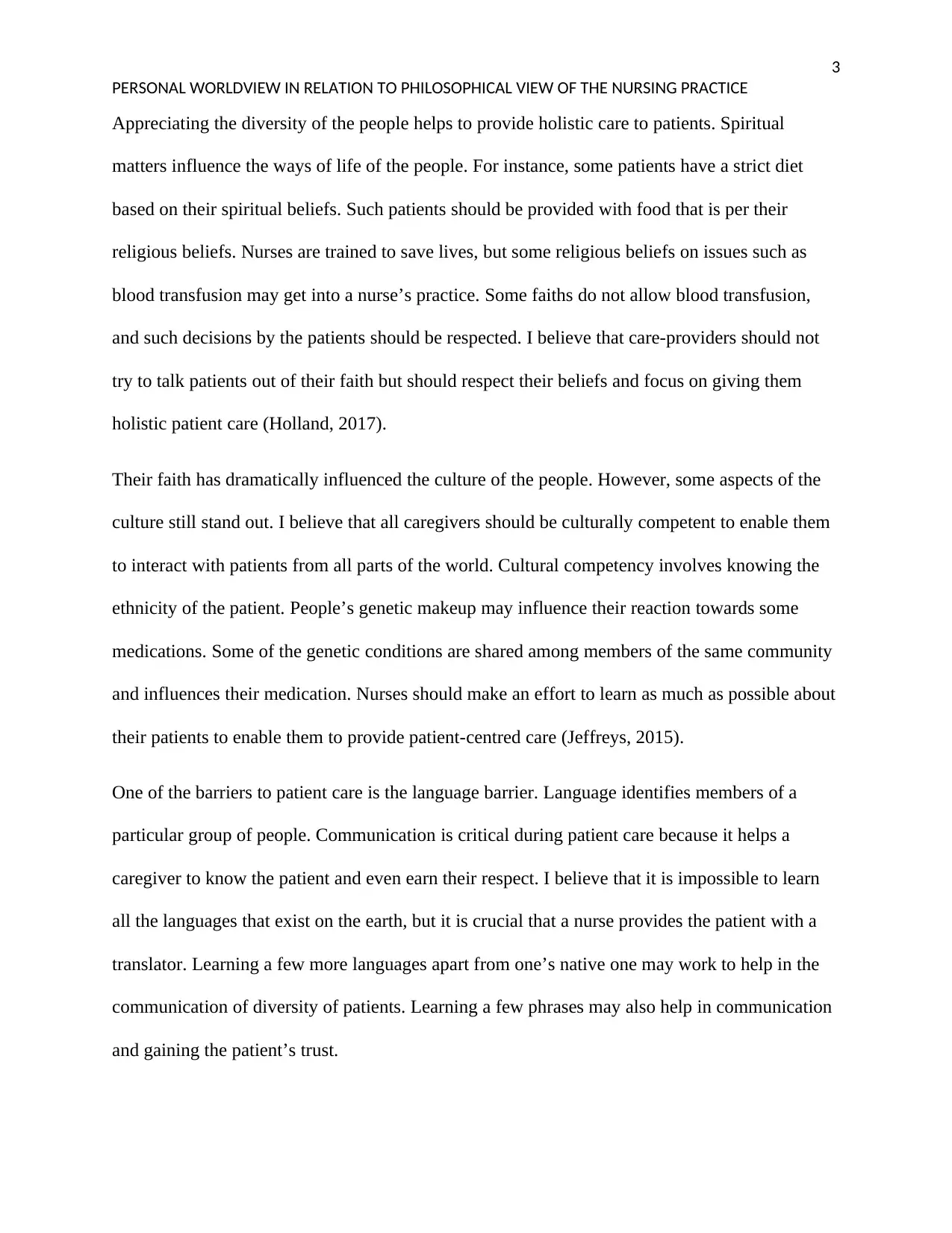
3
PERSONAL WORLDVIEW IN RELATION TO PHILOSOPHICAL VIEW OF THE NURSING PRACTICE
Appreciating the diversity of the people helps to provide holistic care to patients. Spiritual
matters influence the ways of life of the people. For instance, some patients have a strict diet
based on their spiritual beliefs. Such patients should be provided with food that is per their
religious beliefs. Nurses are trained to save lives, but some religious beliefs on issues such as
blood transfusion may get into a nurse’s practice. Some faiths do not allow blood transfusion,
and such decisions by the patients should be respected. I believe that care-providers should not
try to talk patients out of their faith but should respect their beliefs and focus on giving them
holistic patient care (Holland, 2017).
Their faith has dramatically influenced the culture of the people. However, some aspects of the
culture still stand out. I believe that all caregivers should be culturally competent to enable them
to interact with patients from all parts of the world. Cultural competency involves knowing the
ethnicity of the patient. People’s genetic makeup may influence their reaction towards some
medications. Some of the genetic conditions are shared among members of the same community
and influences their medication. Nurses should make an effort to learn as much as possible about
their patients to enable them to provide patient-centred care (Jeffreys, 2015).
One of the barriers to patient care is the language barrier. Language identifies members of a
particular group of people. Communication is critical during patient care because it helps a
caregiver to know the patient and even earn their respect. I believe that it is impossible to learn
all the languages that exist on the earth, but it is crucial that a nurse provides the patient with a
translator. Learning a few more languages apart from one’s native one may work to help in the
communication of diversity of patients. Learning a few phrases may also help in communication
and gaining the patient’s trust.
PERSONAL WORLDVIEW IN RELATION TO PHILOSOPHICAL VIEW OF THE NURSING PRACTICE
Appreciating the diversity of the people helps to provide holistic care to patients. Spiritual
matters influence the ways of life of the people. For instance, some patients have a strict diet
based on their spiritual beliefs. Such patients should be provided with food that is per their
religious beliefs. Nurses are trained to save lives, but some religious beliefs on issues such as
blood transfusion may get into a nurse’s practice. Some faiths do not allow blood transfusion,
and such decisions by the patients should be respected. I believe that care-providers should not
try to talk patients out of their faith but should respect their beliefs and focus on giving them
holistic patient care (Holland, 2017).
Their faith has dramatically influenced the culture of the people. However, some aspects of the
culture still stand out. I believe that all caregivers should be culturally competent to enable them
to interact with patients from all parts of the world. Cultural competency involves knowing the
ethnicity of the patient. People’s genetic makeup may influence their reaction towards some
medications. Some of the genetic conditions are shared among members of the same community
and influences their medication. Nurses should make an effort to learn as much as possible about
their patients to enable them to provide patient-centred care (Jeffreys, 2015).
One of the barriers to patient care is the language barrier. Language identifies members of a
particular group of people. Communication is critical during patient care because it helps a
caregiver to know the patient and even earn their respect. I believe that it is impossible to learn
all the languages that exist on the earth, but it is crucial that a nurse provides the patient with a
translator. Learning a few more languages apart from one’s native one may work to help in the
communication of diversity of patients. Learning a few phrases may also help in communication
and gaining the patient’s trust.
⊘ This is a preview!⊘
Do you want full access?
Subscribe today to unlock all pages.

Trusted by 1+ million students worldwide
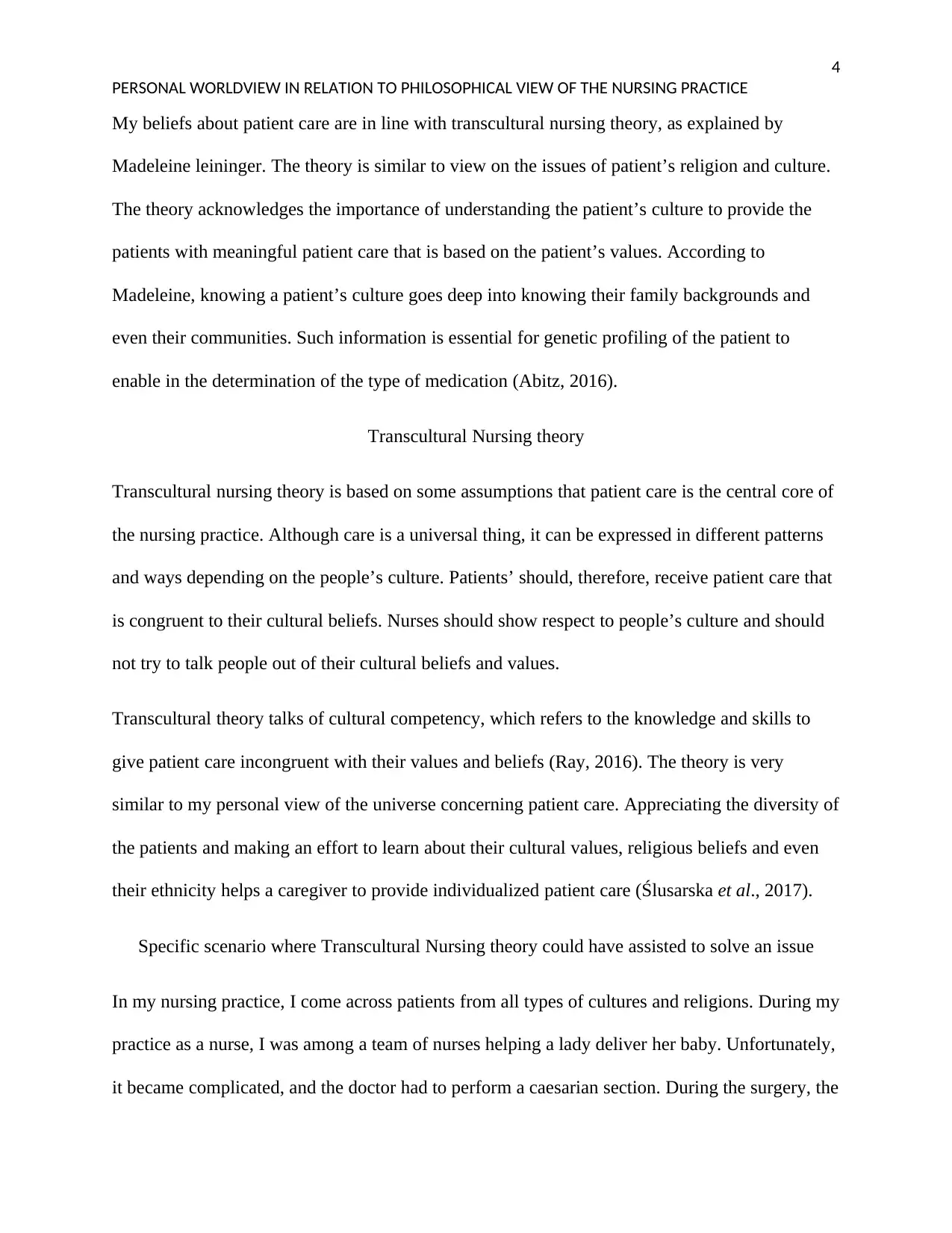
4
PERSONAL WORLDVIEW IN RELATION TO PHILOSOPHICAL VIEW OF THE NURSING PRACTICE
My beliefs about patient care are in line with transcultural nursing theory, as explained by
Madeleine leininger. The theory is similar to view on the issues of patient’s religion and culture.
The theory acknowledges the importance of understanding the patient’s culture to provide the
patients with meaningful patient care that is based on the patient’s values. According to
Madeleine, knowing a patient’s culture goes deep into knowing their family backgrounds and
even their communities. Such information is essential for genetic profiling of the patient to
enable in the determination of the type of medication (Abitz, 2016).
Transcultural Nursing theory
Transcultural nursing theory is based on some assumptions that patient care is the central core of
the nursing practice. Although care is a universal thing, it can be expressed in different patterns
and ways depending on the people’s culture. Patients’ should, therefore, receive patient care that
is congruent to their cultural beliefs. Nurses should show respect to people’s culture and should
not try to talk people out of their cultural beliefs and values.
Transcultural theory talks of cultural competency, which refers to the knowledge and skills to
give patient care incongruent with their values and beliefs (Ray, 2016). The theory is very
similar to my personal view of the universe concerning patient care. Appreciating the diversity of
the patients and making an effort to learn about their cultural values, religious beliefs and even
their ethnicity helps a caregiver to provide individualized patient care (Ślusarska et al., 2017).
Specific scenario where Transcultural Nursing theory could have assisted to solve an issue
In my nursing practice, I come across patients from all types of cultures and religions. During my
practice as a nurse, I was among a team of nurses helping a lady deliver her baby. Unfortunately,
it became complicated, and the doctor had to perform a caesarian section. During the surgery, the
PERSONAL WORLDVIEW IN RELATION TO PHILOSOPHICAL VIEW OF THE NURSING PRACTICE
My beliefs about patient care are in line with transcultural nursing theory, as explained by
Madeleine leininger. The theory is similar to view on the issues of patient’s religion and culture.
The theory acknowledges the importance of understanding the patient’s culture to provide the
patients with meaningful patient care that is based on the patient’s values. According to
Madeleine, knowing a patient’s culture goes deep into knowing their family backgrounds and
even their communities. Such information is essential for genetic profiling of the patient to
enable in the determination of the type of medication (Abitz, 2016).
Transcultural Nursing theory
Transcultural nursing theory is based on some assumptions that patient care is the central core of
the nursing practice. Although care is a universal thing, it can be expressed in different patterns
and ways depending on the people’s culture. Patients’ should, therefore, receive patient care that
is congruent to their cultural beliefs. Nurses should show respect to people’s culture and should
not try to talk people out of their cultural beliefs and values.
Transcultural theory talks of cultural competency, which refers to the knowledge and skills to
give patient care incongruent with their values and beliefs (Ray, 2016). The theory is very
similar to my personal view of the universe concerning patient care. Appreciating the diversity of
the patients and making an effort to learn about their cultural values, religious beliefs and even
their ethnicity helps a caregiver to provide individualized patient care (Ślusarska et al., 2017).
Specific scenario where Transcultural Nursing theory could have assisted to solve an issue
In my nursing practice, I come across patients from all types of cultures and religions. During my
practice as a nurse, I was among a team of nurses helping a lady deliver her baby. Unfortunately,
it became complicated, and the doctor had to perform a caesarian section. During the surgery, the
Paraphrase This Document
Need a fresh take? Get an instant paraphrase of this document with our AI Paraphraser
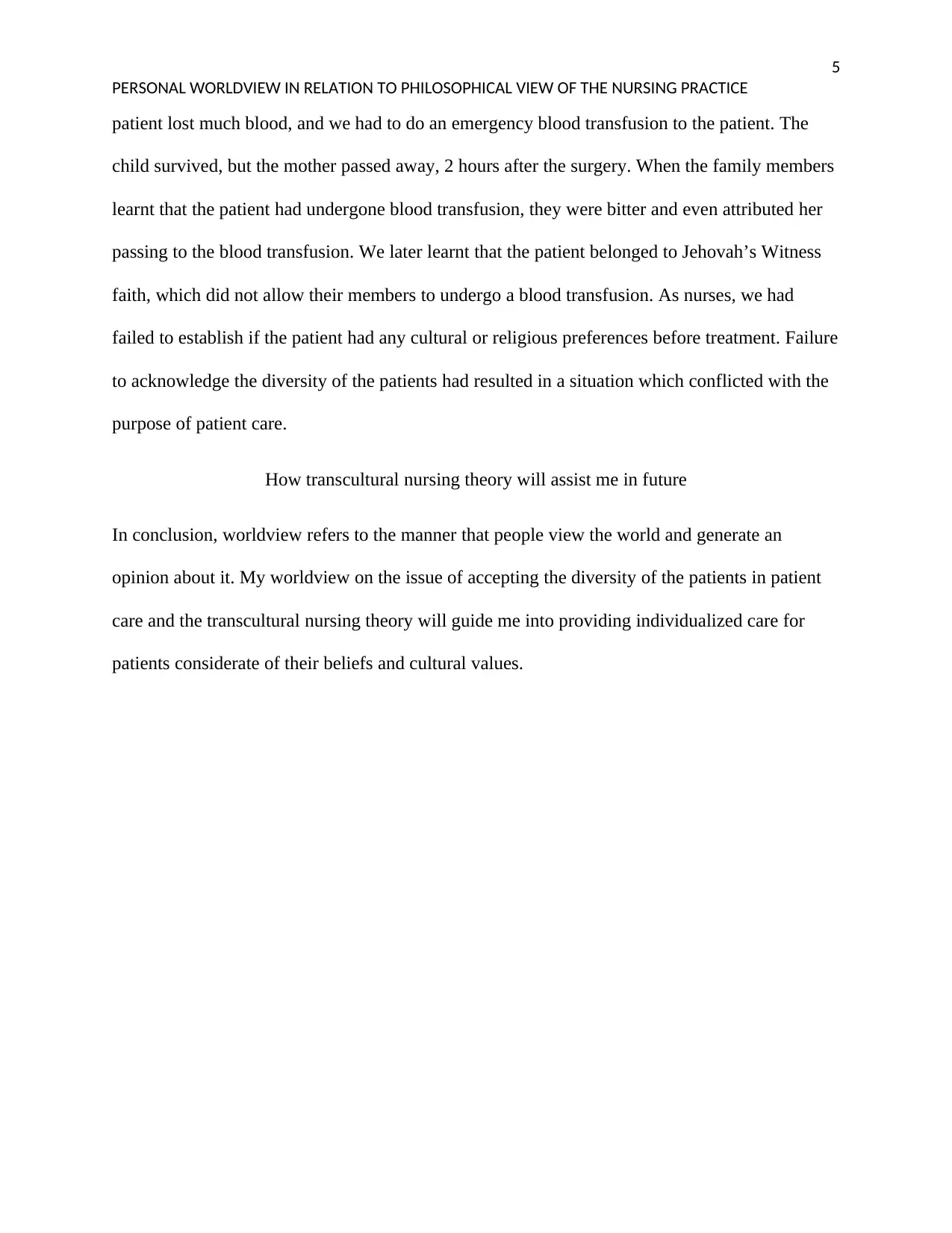
5
PERSONAL WORLDVIEW IN RELATION TO PHILOSOPHICAL VIEW OF THE NURSING PRACTICE
patient lost much blood, and we had to do an emergency blood transfusion to the patient. The
child survived, but the mother passed away, 2 hours after the surgery. When the family members
learnt that the patient had undergone blood transfusion, they were bitter and even attributed her
passing to the blood transfusion. We later learnt that the patient belonged to Jehovah’s Witness
faith, which did not allow their members to undergo a blood transfusion. As nurses, we had
failed to establish if the patient had any cultural or religious preferences before treatment. Failure
to acknowledge the diversity of the patients had resulted in a situation which conflicted with the
purpose of patient care.
How transcultural nursing theory will assist me in future
In conclusion, worldview refers to the manner that people view the world and generate an
opinion about it. My worldview on the issue of accepting the diversity of the patients in patient
care and the transcultural nursing theory will guide me into providing individualized care for
patients considerate of their beliefs and cultural values.
PERSONAL WORLDVIEW IN RELATION TO PHILOSOPHICAL VIEW OF THE NURSING PRACTICE
patient lost much blood, and we had to do an emergency blood transfusion to the patient. The
child survived, but the mother passed away, 2 hours after the surgery. When the family members
learnt that the patient had undergone blood transfusion, they were bitter and even attributed her
passing to the blood transfusion. We later learnt that the patient belonged to Jehovah’s Witness
faith, which did not allow their members to undergo a blood transfusion. As nurses, we had
failed to establish if the patient had any cultural or religious preferences before treatment. Failure
to acknowledge the diversity of the patients had resulted in a situation which conflicted with the
purpose of patient care.
How transcultural nursing theory will assist me in future
In conclusion, worldview refers to the manner that people view the world and generate an
opinion about it. My worldview on the issue of accepting the diversity of the patients in patient
care and the transcultural nursing theory will guide me into providing individualized care for
patients considerate of their beliefs and cultural values.
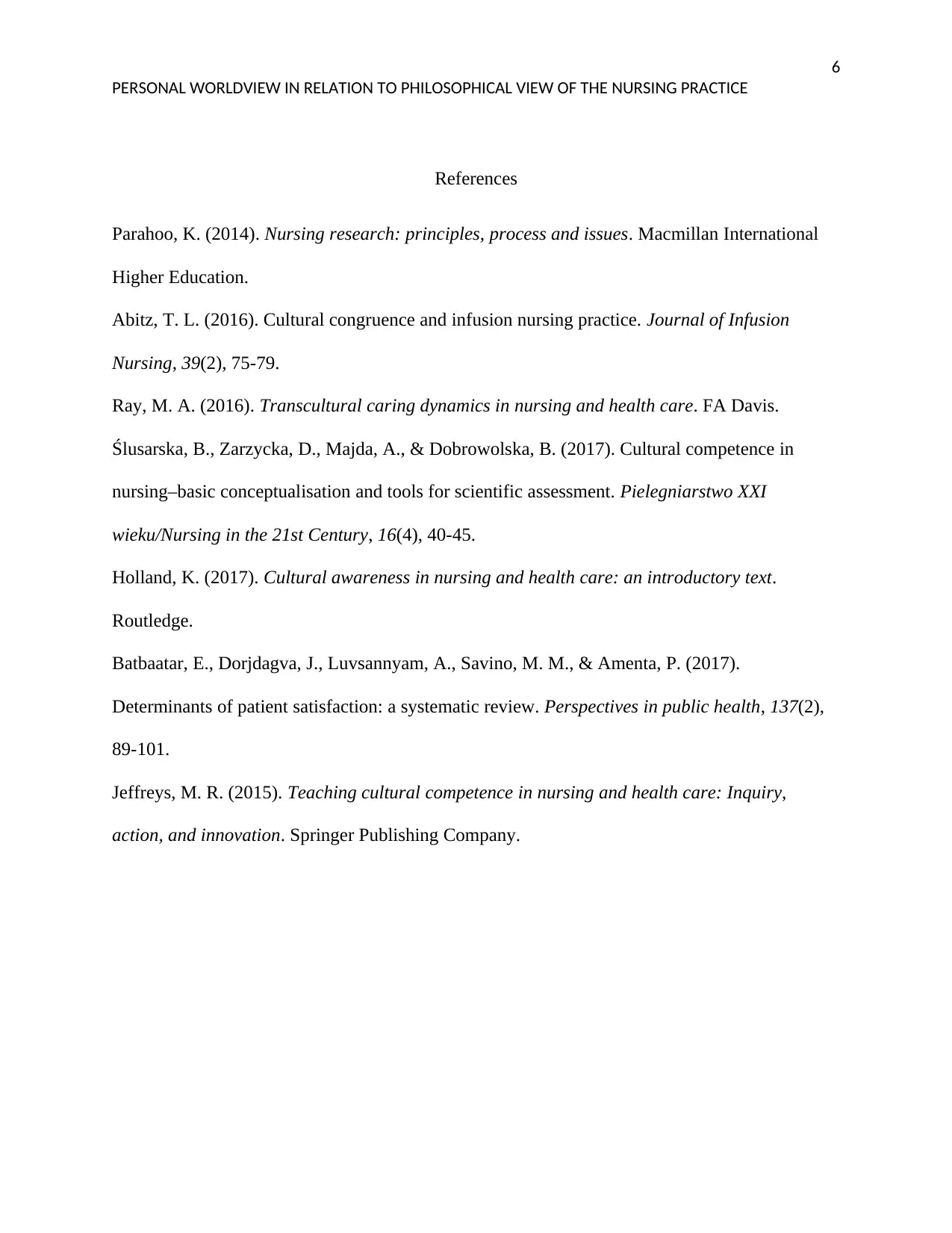
6
PERSONAL WORLDVIEW IN RELATION TO PHILOSOPHICAL VIEW OF THE NURSING PRACTICE
References
Parahoo, K. (2014). Nursing research: principles, process and issues. Macmillan International
Higher Education.
Abitz, T. L. (2016). Cultural congruence and infusion nursing practice. Journal of Infusion
Nursing, 39(2), 75-79.
Ray, M. A. (2016). Transcultural caring dynamics in nursing and health care. FA Davis.
Ślusarska, B., Zarzycka, D., Majda, A., & Dobrowolska, B. (2017). Cultural competence in
nursing–basic conceptualisation and tools for scientific assessment. Pielegniarstwo XXI
wieku/Nursing in the 21st Century, 16(4), 40-45.
Holland, K. (2017). Cultural awareness in nursing and health care: an introductory text.
Routledge.
Batbaatar, E., Dorjdagva, J., Luvsannyam, A., Savino, M. M., & Amenta, P. (2017).
Determinants of patient satisfaction: a systematic review. Perspectives in public health, 137(2),
89-101.
Jeffreys, M. R. (2015). Teaching cultural competence in nursing and health care: Inquiry,
action, and innovation. Springer Publishing Company.
PERSONAL WORLDVIEW IN RELATION TO PHILOSOPHICAL VIEW OF THE NURSING PRACTICE
References
Parahoo, K. (2014). Nursing research: principles, process and issues. Macmillan International
Higher Education.
Abitz, T. L. (2016). Cultural congruence and infusion nursing practice. Journal of Infusion
Nursing, 39(2), 75-79.
Ray, M. A. (2016). Transcultural caring dynamics in nursing and health care. FA Davis.
Ślusarska, B., Zarzycka, D., Majda, A., & Dobrowolska, B. (2017). Cultural competence in
nursing–basic conceptualisation and tools for scientific assessment. Pielegniarstwo XXI
wieku/Nursing in the 21st Century, 16(4), 40-45.
Holland, K. (2017). Cultural awareness in nursing and health care: an introductory text.
Routledge.
Batbaatar, E., Dorjdagva, J., Luvsannyam, A., Savino, M. M., & Amenta, P. (2017).
Determinants of patient satisfaction: a systematic review. Perspectives in public health, 137(2),
89-101.
Jeffreys, M. R. (2015). Teaching cultural competence in nursing and health care: Inquiry,
action, and innovation. Springer Publishing Company.
⊘ This is a preview!⊘
Do you want full access?
Subscribe today to unlock all pages.

Trusted by 1+ million students worldwide
1 out of 6
Related Documents
Your All-in-One AI-Powered Toolkit for Academic Success.
+13062052269
info@desklib.com
Available 24*7 on WhatsApp / Email
![[object Object]](/_next/static/media/star-bottom.7253800d.svg)
Unlock your academic potential
Copyright © 2020–2026 A2Z Services. All Rights Reserved. Developed and managed by ZUCOL.





